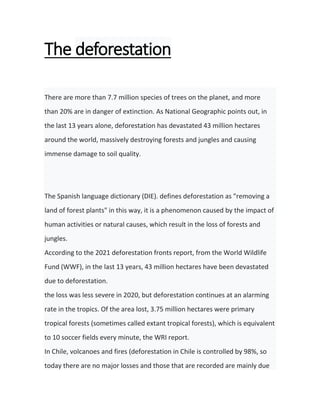
The deforestation.docx
- 1. The deforestation There are more than 7.7 million species of trees on the planet, and more than 20% are in danger of extinction. As National Geographic points out, in the last 13 years alone, deforestation has devastated 43 million hectares around the world, massively destroying forests and jungles and causing immense damage to soil quality. The Spanish language dictionary (DIE). defines deforestation as "removing a land of forest plants" in this way, it is a phenomenon caused by the impact of human activities or natural causes, which result in the loss of forests and jungles. According to the 2021 deforestation fronts report, from the World Wildlife Fund (WWF), in the last 13 years, 43 million hectares have been devastated due to deforestation. the loss was less severe in 2020, but deforestation continues at an alarming rate in the tropics. Of the area lost, 3.75 million hectares were primary tropical forests (sometimes called extant tropical forests), which is equivalent to 10 soccer fields every minute, the WRI report. In Chile, volcanoes and fires (deforestation in Chile is controlled by 98%, so today there are no major losses and those that are recorded are mainly due
- 2. to eruptions or volcanic activity or forest fires, says veronica oyurzun, head of the monitoring department of plant ecosystems of conaf. Some consequences of deforestation are the following: 1. removal of tree species 2. loss of habitats 3. fire vulnerability 4. climatic alterations 5. reduction of natural resources 6. impact on sustainable tourism 7. global warming 8. loss of biodiversity 9. alterations of the water cycle 10.economic and environmental instability Our group agrees that deforestation definitely affects the environment in many ways such as the purification of water, and of the air that without its purification emits carbon dioxide which favors global warming and the destruction of the bear layer, well we have to think more about deforestation and the dangers it produces, this has been the conclusion.
- 3. bibliography primary: national geographic-ministry of the environment-Greenpeace secondary: becas santander-thenergy scholarships
